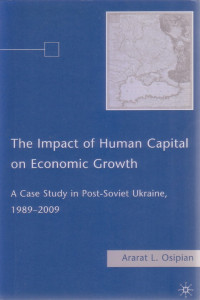
Text
The Impact of Human Capital on Economic Growth: A Case Study in Post-Soviet Ukraine, 1989-2009
The ideas of public spending and foreign investment as major engines of economic growth, especially in developing nations, are now replaced with ideas about the importance of reinvestment and development of domestic market. The theories of growth based on the fundamental assumption that a significant influx of the resources is necessary to initiate sustainable growth do not hold. They might work to a certain degree in the developing world, but appear to be insufficient to explain rapid economic growth in Ukraine and other industrialized nations of the former Sovit Bloc. Theories of import substitution now compete with post-structuralism. In education, long dominated concept of manpower forecasting gives way to market reforms. These two trends-structural reforms with domestic market development and market reforms in the education sector-define the future landscape of transition economies.
The goal of this book is to identify the place and the role of human capital in economic growth in the market-type post-transition economies. It fills the gap between the rapid economic growth as an objective economic reality of Ukraine and Russia and the lack of scholarly literature on the issue. This book focuses on the role of human capital as a necessary ground for initiation of economic growth in transition economies. In our view, the choice of both the object of the research and the time frame is very successful and well-justified. In the future, one would like to see further development of the research on sustainable economic growth in those economic systems that are currently not in equilibrium and only move toward their steady state.
Ketersediaan
| B00655 | 338.9477 OSI i | My Library | Tersedia |
Informasi Detail
- Judul Seri
-
-
- No. Panggil
-
338.9477 OSI i
- Penerbit
- New York : Palgrave Macmillan., 2009
- Deskripsi Fisik
-
xix, 208 pages : 14,5 x 22 cm
- Bahasa
-
English
- ISBN/ISSN
-
9780230618244
- Klasifikasi
-
338.9477
- Tipe Isi
-
text
- Tipe Media
-
unmediated
- Tipe Pembawa
-
volume
- Edisi
-
-
- Subjek
- Info Detail Spesifik
-
-
- Pernyataan Tanggungjawab
-
-
Versi lain/terkait
Tidak tersedia versi lain
Komentar
Anda harus masuk sebelum memberikan komentar
 Karya Umum
Karya Umum  Filsafat
Filsafat  Agama
Agama  Ilmu-ilmu Sosial
Ilmu-ilmu Sosial  Bahasa
Bahasa  Ilmu-ilmu Murni
Ilmu-ilmu Murni  Ilmu-ilmu Terapan
Ilmu-ilmu Terapan  Kesenian, Hiburan, dan Olahraga
Kesenian, Hiburan, dan Olahraga  Kesusastraan
Kesusastraan  Geografi dan Sejarah
Geografi dan Sejarah  E-Book
E-Book